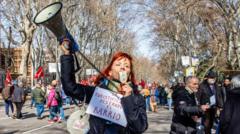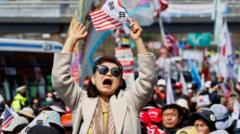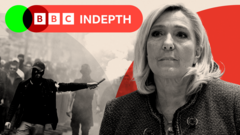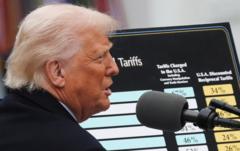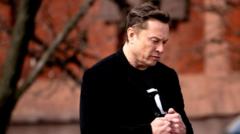Following the court's decision, political tensions give way to hope for a fresh start in leadership as the nation confronts its turbulent past.
**South Korea Celebrates Political Shift as Court Exiles Controversial President Yoon Suk Yeol**

**South Korea Celebrates Political Shift as Court Exiles Controversial President Yoon Suk Yeol**
The Constitutional Court's ruling prompts jubilation among supporters of democracy as South Korea gears up for a new election.
**Seoul, South Korea** – In a landmark ruling that reverberated across the nation, South Korea's Constitutional Court unanimously upheld the impeachment of President Yoon Suk Yeol, a decision that has sparked celebrations and renewed hopes for democratic governance. The ruling was delivered live on television, underpinning its historic significance and reaching millions of citizens nationwide.
Yoon's presidency was marked by significant upheaval, particularly following his controversial declaration of martial law in December, which was swiftly overturned by lawmakers. The Court's eight justices determined that Yoon's actions severely undermined the rule of law and betrayed public trust. His administration has been riddled with scandals, leading to widespread protests and public demands for accountability.
Supporters of the ruling gathered in large numbers outside the court, erupting into cheers and tears of joy. Lee Jae-myung, the leading opposition figure, heralded the court's decision as a restoration of democracy, setting the stage for the upcoming presidential election set to take place within 60 days—a significant step toward political healing in the nation.
Amid jubilation, there was an undertone of concern among Yoon's supporters, many of whom expressed fears about the implications for South Korea’s political future. As the dust settles from this monumental event, citizens are left to ponder what lies ahead for the nation and how it will navigate the cleaning-up process following Yoon's controversial term.
With expectations rife for the coming election, political parties are poised to clarify their candidates. The ruling Democratic Party is anticipated to nominate Lee Jae-myung, while the People Power Party seeks to identify a viable successor for the impending political battle.
As the interim president, Han Duck-soo, oversees the transition, South Koreans remain hopeful for a more stable and representative leadership, one that fosters unity amid the political divide that has become more pronounced over recent months. This moment marks a pivotal juncture in South Korea's quest for democratic integrity—a defining moment as it marches toward a new chapter in governance.
Yoon's presidency was marked by significant upheaval, particularly following his controversial declaration of martial law in December, which was swiftly overturned by lawmakers. The Court's eight justices determined that Yoon's actions severely undermined the rule of law and betrayed public trust. His administration has been riddled with scandals, leading to widespread protests and public demands for accountability.
Supporters of the ruling gathered in large numbers outside the court, erupting into cheers and tears of joy. Lee Jae-myung, the leading opposition figure, heralded the court's decision as a restoration of democracy, setting the stage for the upcoming presidential election set to take place within 60 days—a significant step toward political healing in the nation.
Amid jubilation, there was an undertone of concern among Yoon's supporters, many of whom expressed fears about the implications for South Korea’s political future. As the dust settles from this monumental event, citizens are left to ponder what lies ahead for the nation and how it will navigate the cleaning-up process following Yoon's controversial term.
With expectations rife for the coming election, political parties are poised to clarify their candidates. The ruling Democratic Party is anticipated to nominate Lee Jae-myung, while the People Power Party seeks to identify a viable successor for the impending political battle.
As the interim president, Han Duck-soo, oversees the transition, South Koreans remain hopeful for a more stable and representative leadership, one that fosters unity amid the political divide that has become more pronounced over recent months. This moment marks a pivotal juncture in South Korea's quest for democratic integrity—a defining moment as it marches toward a new chapter in governance.


